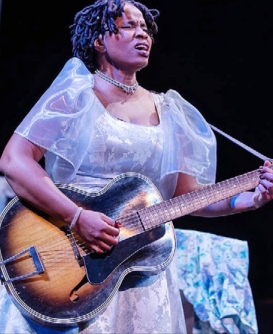
Lovely Hoffman as Sister Rosetta Tharpe.
Front Porch Arts and Greater Boston Stage Company have teamed up for another production, this time to tell the buried story of gospel star Sister Rosetta Tharpe. “Marie and Rosetta,” playing through Nov. 10 at the Greater Boston Stage Company’s Stoneham theater, specifically focuses on Tharpe’s relationship with Marie Knight, her lover and creative partner for a decade of her life.
Tharpe was born to two cotton field workers in the Jim Crow South of 1915. Growing up in a church that thrived on musical expression, Tharpe became enamored with the art form. She became a traveling performer at age 6 and performed with musicians like Duke Ellington. As she grew in fame and began signing record deals, Tharpe turned the genre on its head by bringing in an electric guitar, vibrant beats and suggestive twists to her lyrics. Tharpe was the mother of rock-and-roll. Her edgy takes on religious songs would later inspire Elvis, Chuck Berry, Johnny Cash and many others.
In “Marie and Rosetta” the audience gets one night of the singer’s life, the night she met Marie Knight. After seeing Knight perform at a church gathering, Tharpe was entranced. She recruited Knight to join her act as a partner, and the show opens with them rehearsing in a coffin shop. Tharpe explains that because they’re black and performing in the deep South, no hotels will take them. They rely on the generosity of the townspeople, even if all they can offer is a coffin to sleep in. In a set covered in coffins, the implications lie heavy and powerful over the whole production.
As Knight and Tharpe get to know each other, the characters touch on many topics, such as the challenges facing black people at that time, most of which are still relevant. “We gotta be invisible,” says Tharpe in one scene. “We step off the stage and we disappear.” The women also discuss their challenges with abusive and neglectful men, how to raise children while pursing their passions and the ramifications of the church. Tharpe is looser in her music and her lifestyle. She focuses on feeling joy, saying that that’s the best way to praise God. Knight moves within a more rigid set of church rules in her lifestyle and her music. In this tension, they explore what it means to worship.
The show offers a beautiful set list and two talented actresses with natural chemistry, Lovely Hoffman as Tharpe and Pier Lamia Porter as Knight. Because of its short run time, 90 minutes, and significant musical offerings, “Marie and Rosetta” isn’t able to deeply explore the many issues touched on by the women’s discourse. The ending, which recaps what happened after that first night, is also a bit rushed, squeezed into the last 20 minutes of the script.
But the most important function of the show, reviving and celebrating Tharpe’s legacy, is well satisfied. Ultimately, “Marie and Rosetta” is a foot-stamping, voice-shaking, heart-wrenching celebration of the two musicians, and of black women everywhere.
ON THE WEB Learn more at: www.greaterbostonstage.org/marieandrosetta.html